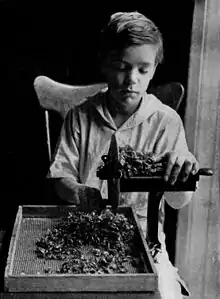Verdingkinder
Verdingkinder, "contract children",[1] or "indentured child laborers"[2] were children in Switzerland who were taken from their parents, often due to poverty or moral reasons (e.g. the mother being unmarried, very poor, of Yenish origin, etc.), and sent to live with new families, often poor farmers who needed cheap labour. Many of these children, now adults, have now come forward to say that they were severely mistreated by their new families, suffering neglect, beatings and other physical and psychological abuse. The Verdingkinder scheme was common in Switzerland until the 1960s.[1][3]

History
Investigations by historian Marco Leuenberger brought to light that in 1930 there were some 35,000 indentured children; though he suspects the real figure was twice that much, and between 1920 and 1970 more than 100,000 are believed to have been placed with families or homes. There were auctions in which children were handed over to the farmer asking the least money from the authorities, thus securing cheap labour for his farm and relieving the authority from the financial burden of looking after the children. In the 1930s, 20% of all agricultural labourers in the Canton of Bern were children below the age of 15.[4]
The petition Wiedergutmachungsinitiative for a "restitution package of about 500 million Swiss Francs (£327m) for the 10,000 contract children estimated to be alive" was launched in April 2014 and acquired the 100,000 signatures necessary to become a national referendum.[5]
An official apology was made on April 11, 2013 by the Swiss government.[2]
In culture
In 2008, Roland Begert,[6] an indentured child himself, published his autobiographical novel "Lange Jahre fremd",[7] causing a stir in Switzerland, where authorities and the general public had previously shut their eyes. Begert's story told how disadvantaged youngsters were forcefully apprenticed and put to work in industry after the war, when there was a shortage of labour. In 2012 an exhibition called "Verdingkinder Reden" ("Contract Children Speak") toured Switzerland, drawing attention to the fate of these children. In the same year, Der Verdingbub ("The Foster Boy"),[8] a feature film, was released, reaching number one at the Swiss box office.[2]
References
- Swiss grapple with history of forced child labor, Associated Press, retrieved 24/11/2011
- Swiss 'contract children' speak out, BBC, retrieved 19/1/2012; and Gianna Virginia Weber: "Das ’Verdingkind‘: Eine terminologische Annäherung" ["The ‘Indentured Child Laborer‘: A Terminological Approach"], in: Markus Furrer, Kevin Heiniger, Thomas Huonker, Sabine Jenzer, Anne-Françoise Praz (eds.): Fürsorge und Zwang: Fremdplatzierungen in der Schweiz 1850-1980 (in German), Basel 2014 (Itinera 36), p. 249-258.
- Marco Leuenberger & Loretta Seglias (eds.): "Versorgt und vergessen. Ehemalige Verdingkinder erzählen (in German), Rotpunktverlag, Zurich; and Lotty Wohlwend & Arthur Honegger: "Gestohlene Seelen: Verdingkinder in der Schweiz (in German), Huber, Bern.
- Ausland: Verdingkinder in der Schweiz: Um die Kindheit betrogen - badische-zeitung.de
- Puri, Kavita (2014-10-29). "Switzerland's shame: The children used as cheap farm labour". BBC News. Retrieved 2014-10-29.
- de:Roland M. Begert
- edition liebefeld - Home
- "Der Verdingbub". SWISS FILMS. Retrieved 2014-10-29.